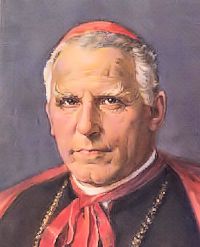Lent: March 22nd
Wednesday of the Third Week of Lent
Other Commemorations: Bl. Clemens August von Galen, Bishop (RM)
» Enjoy our Liturgical Seasons series of e-books!
"Do not imagine that I have come to abolish the Law or the Prophets. I have come not to abolish but to fulfill. Amen, I say to you, until heaven and earth pass away, not the smallest letter or the smallest part of a letter will pass from the law, until all things have taken place. Therefore, whoever breaks one of the least of these commandments and teaches others to do so will be called least in the Kingdom of heaven. But whoever obeys and teaches these commandments will be called greatest in the Kingdom of heaven (Mt 5:17-19)."
| The Station, at Rome, is in the church of St. Sisto Vecchio. It was built in the 4th century, and was one of the first parish churches in Rome and was known as the Titulus Crescentianae. Tradition claims that it was founded by Pope Anastasius I. | 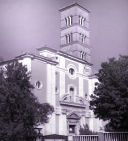 |
Meditation - Baptismal Graces and Obligations
Like the neophytes of the early Church, we now seek to stir up in our hearts the grace which we received at our baptism. We are the children of God and the heirs of the kingdom of heaven. If we prove true to the vows we made at our baptism, we shall hear that blessed invitation on the day of judgment: "Come ye blessed of My Father, possess you the kingdom prepared for you from the foundation of the world." How eternally thankful to God we shall then be for having incorporated us into Himself and His Church through baptism!
By baptism we were incorporated in Christ as a member of His body, or as a branch of the vine. Christ lives in His members as a vine lives in its branches. What is done to the members of Christ, then, is done also to Him. "This is My commandment, that you love one another as I have loved you" (John 15:12). We shall all be judged by the degree of charity we practiced with regard to our neighbor.
"As long as you did it to one of these My least brethren, you did it to Me" (Gospel). It is a spiritual work of mercy to pray for sinners and to undertake sacrifices for them that they may find the grace to return to God. Since they are still members of the same body, although diseased, we feel a responsibility for their conversion. We become even more conscious of this responsibility during Lent. The Lord has assured us, "I desire not the death of the wicked, but that the wicked turn from his way and live" (Ezech. 33:11).
Excerpted from The Light of the World, Benedict Baur, O.S.B.
Things to Do:
- Today's Gospel provides the basis for the corporal works of mercy: feed the hungry; give drink to the thirsty; clothe the naked; harbor the harborless; visit the sick; ransom the captive; bury the dead. Discuss this Gospel with your children — this is an important truth that will guide them in charity all their life. Give practical examples: if he obeys his parents, shares a toy with his brother or sister, or gives alms to the poor, then he is doing all these loving things to Jesus Himself.
Bl. Clemens August von Galen
Clemens August von Galen was born on 16 March 1878 in Dinklage Castle, Oldenburg, Germany, the 11th of 13 children born to Count Ferdinand Heribert and Elisabeth von Spee.
His father belonged to the noble family of Westphalia, who since 1660 governed the village of Dinklage. For over two centuries his ancestors carried out the inherited office of camerlengo of the Diocese of Münster.
Clemens August grew up in Dinklage Castle and in other family seats. Due to the struggle between Church and State, he and his brothers were sent to a school run by the Jesuits in Feldkirch, Austria.
He remained there until 1894, when he transferred to the Antonianum in Vechta. After graduation, he studied philosophy and theology in Frebur, Innsbruck and Münster, and was ordained a priest on 28 May 1904 for the Diocese of Münster by Bishop Hermann Dingelstadt.
Parish priest, concern for poor
His first two years as a priest were spent as vicar of the diocesan cathedral where he became chaplain to his uncle, Bishop Maximilian Gerion von Galen.
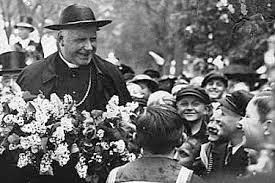 From 1906 to 1929, Fr von Galen carried out much of his pastoral activity outside Münster: in 1906 he was made chaplain of the parish of St Matthias in Berlin-Schönberg; from 1911 to 1919 he was curate of a new parish in Berlin before becoming parish priest of the Basilica of St Matthias in Berlin-Schönberg, where he served for 10 years; here, he was particularly remembered for his special concern for the poor and outcasts.
From 1906 to 1929, Fr von Galen carried out much of his pastoral activity outside Münster: in 1906 he was made chaplain of the parish of St Matthias in Berlin-Schönberg; from 1911 to 1919 he was curate of a new parish in Berlin before becoming parish priest of the Basilica of St Matthias in Berlin-Schönberg, where he served for 10 years; here, he was particularly remembered for his special concern for the poor and outcasts.
In 1929, Fr von Galen was called back to Münster when Bishop Johannes Poggenpohl asked him to serve as parish priest of the Church of St Lambert.
"Nec laudibus, nec timore"
In January 1933, Bishop Poggenpohl died, leaving the See vacant. After two candidates refused, on September 5, 1933 Fr Clemens was appointed Bishop of Münster by Pope Pius XI.
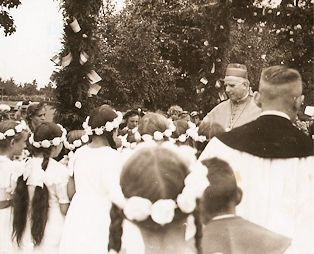 On October 28, 1933 he was consecrated by Cardinal Joseph Schulte, Archbishop of Cologne; Bishop von Galen was the first diocesan Bishop to be consecrated under Hitler's regime.
On October 28, 1933 he was consecrated by Cardinal Joseph Schulte, Archbishop of Cologne; Bishop von Galen was the first diocesan Bishop to be consecrated under Hitler's regime.
As his motto, he chose the formula of the rite of episcopal consecration: "Nec laudibus, nec timore" (Neither praise nor threats will distance me from God).
Throughout the 20 years that Bishop von Galen was curate and parish priest in Berlin, he wrote on various political and social issues; in a pastoral letter dated 26 March 1934, he wrote very clearly and critically on the "neopaganism of the national socialist ideology".
Due to his outspoken criticism, he was called to Rome by Pope Pius XI in 1937 together with the Bishop of Berlin, to confer with them on the situation in Germany and speak of the eventual publication of an Encyclical.
On 14 March 1937 the Encyclical Mit brennender Sorge (To the Bishops of Germany: The place of the Catholic Church in the German Reich) was published. It was widely circulated by Bishop von Galen, notwithstanding Nazi opposition.
"Lion of Munster"
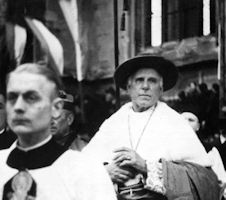 In the summer of 1941, in answer to unwarranted attacks by the National Socialists, Bishop von Galen delivered three admonitory sermons between July and August. He spoke in his old parish Church of St Lambert and in Liebfrauen-Ueberlassen Church, since the diocesan cathedral had been bombed.
In the summer of 1941, in answer to unwarranted attacks by the National Socialists, Bishop von Galen delivered three admonitory sermons between July and August. He spoke in his old parish Church of St Lambert and in Liebfrauen-Ueberlassen Church, since the diocesan cathedral had been bombed.
In his famous speeches, Bishop von Galen spoke out against the State confiscation of Church property and the programmatic euthanasia carried out by the regime.
The clarity and incisiveness of his words and the unshakable fidelity of Catholics in the Diocese of Münster embarrassed the Nazi regime, and on 10 October 1943 the Bishop's residence was bombed. Bishop von Galen was forced to take refuge in nearby Borromeo College.
From 12 September 1944 on, he could no longer remain in the city of Münster, destroyed by the war; he left for the zone of Sendenhorst.
In 1945, Vatican Radio announced that Pope Pius XII was to hold a Consistory and that the Bishop of Münster was also to be present.
Creation of a Cardinal
After a long and difficult journey, due to the war and other impediments, Bishop von Galen finally arrived in the "Eternal City." On 21 February 1946 the Public Consistory was held in St Peter's Basilica and Bishop von Galen was created a Cardinal.
On 16 March 1946 the 68-year-old Cardinal returned to Münster. He was cordially welcomed back by the city Authorities and awarded honorary citizenship by the burgomaster.
On the site of what remained of the cathedral, Cardinal von Galen gave his first (and what would be his last) discourse to the more than 50,000 people who had gathered, thanking them for their fidelity to the then-Bishop of Münster during the National Socialist regime. He explained that as a Bishop, it was his duty to speak clearly and plainly about what was happening.
No one knew that the Cardinal was gravely ill, and when he returned to Münster on 19 March 1946 he had to undergo an operation.
Cardinal von Galen died just three days later, on 22 March. He was buried on 28 March in the Ludgerus Chapel, which has become a place of pilgrimage to this defender of the faith in the face of political oppression.
—©Libreria Editrice Vaticana
Highlights and Things to Do:
- Read this sermon by Bl. Clemens August Count von Galen.
- From Catholic Culture's Library read these inspiring articles on the life of Bl. Clemens August Count von Galen:
- The Cardinal's remains are in the Münster Cathedral in Westphalia, Germany.
- See his listing on Catholic-Hierarchy.


